It’s that time again! Here’s a run-down of what I read in 2017. It’s newly on my bucket list to read all the Pulitzer-winning novels, and this year’s list has 2: His Family, the first one, and The Underground Railroad, the latest one. I prefer the first, and below you’ll see why.
Must Read
Best of 2017:
A Gentleman in Moscow, Amor Towles
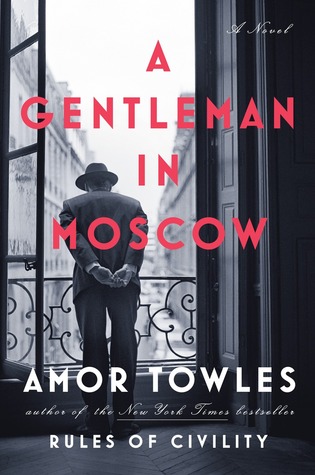 From Goodreads: A Gentleman in Moscow immerses us in another elegantly drawn era with the story of Count Alexander Rostov. When, in 1922, he is deemed an unrepentant aristocrat by a Bolshevik tribunal, the count is sentenced to house arrest in the Metropol, a grand hotel across the street from the Kremlin. Rostov, an indomitable man of erudition and wit, has never worked a day in his life, and must now live in an attic room while some of the most tumultuous decades in Russian history are unfolding outside the hotel’s doors. Unexpectedly, his reduced circumstances provide him a doorway into a much larger world of emotional discovery.
From Goodreads: A Gentleman in Moscow immerses us in another elegantly drawn era with the story of Count Alexander Rostov. When, in 1922, he is deemed an unrepentant aristocrat by a Bolshevik tribunal, the count is sentenced to house arrest in the Metropol, a grand hotel across the street from the Kremlin. Rostov, an indomitable man of erudition and wit, has never worked a day in his life, and must now live in an attic room while some of the most tumultuous decades in Russian history are unfolding outside the hotel’s doors. Unexpectedly, his reduced circumstances provide him a doorway into a much larger world of emotional discovery.
My take on it: Yes, it’s like Terminal, but in a hotel, but there’s so much more to it, so rich a storyline. There are so many vignettes that could be classic short stories in their own right: I could read the Triumvirate’s “Night of the Bouillabaisse” over and over and over again.
Overall, the book can be summarized in the Count’s lesson from life:
If one did not master one’s circumstances, one was bound to be mastered by them.
I would have loved it even had it simply ended as a memoir-type novel, but at about 83% you get the sense that there’s a game afoot, and then there is, and then there’s a resolution, which you didn’t expect at all, and you love the Count even more. My only negative comment is that at the end, you feel such a sadness that you’ll not be continuing your newly established friendship with the wonder that is Alexander.
I can’t believe it wasn’t a finalist for the Pulitzer. It was every bit as richly written as All the Light We Cannot See. My favorite of the year so far. Can you tell I enjoyed this book? Time and space fail me to quote all that I loved, but let’s have a go.
Fate would not have the reputation it has if it simply did what it seemed it would do.
What can a first impression tell us about anyone? Why, no more than a chord can tell us about Beethoven, or a brushstroke about Botticelli. By their very nature, human beings are so capricious, so complex, so delightfully contradictory, that they deserve not only our consideration but our reconsideration–and our unwavering determination to withhold our opinion until we have engaged with them in every possible setting at every possible hour.
Coffee can energize the industrious at dawn, calm the reflective at noon, or raise the spirits of the beleaguered in the middle of the night.
If patience wasn’t so easily tested, then it would hardly be a virtue.
While a man should attend closely to life, he should not attend to too closely to the clock.
As a people, we Russians have proven unusually adept at destroying that which we have created.
Speaking of a man released from the Gulag:
Here were not simply the ravages of time. Here were the marks of one man upon another, of an era upon its offspring.
My new motto for 2018:
What is an intention compared to a plan?
And what a life philosophy:
These are the greatest of conveniences… I had them all. But in the end, it has been the inconveniences that have mattered to me most.
The Hundred-Year-Old Man Who Climbed Out of the Window and Disappeared, Jonas Jonasson
 On Goodreads: It all starts on the one-hundredth birthday of Allan Karlsson. Sitting quietly in his room in an old people’s home, he is waiting for the party he-never-wanted-anyway to begin. The Mayor is going to be there. The press is going to be there. But, as it turns out, Allan is not… Slowly but surely Allan climbs out of his bedroom window, into the flowerbed (in his slippers) and makes his getaway. And so begins his picaresque and unlikely journey involving criminals, several murders, a suitcase full of cash, and incompetent police. As his escapades unfold, we learn something of Allan’s earlier life in which – remarkably – he helped to make the atom bomb, became friends with American presidents, Russian tyrants, and Chinese leaders, and was a participant behind the scenes in many key events of the twentieth century.
On Goodreads: It all starts on the one-hundredth birthday of Allan Karlsson. Sitting quietly in his room in an old people’s home, he is waiting for the party he-never-wanted-anyway to begin. The Mayor is going to be there. The press is going to be there. But, as it turns out, Allan is not… Slowly but surely Allan climbs out of his bedroom window, into the flowerbed (in his slippers) and makes his getaway. And so begins his picaresque and unlikely journey involving criminals, several murders, a suitcase full of cash, and incompetent police. As his escapades unfold, we learn something of Allan’s earlier life in which – remarkably – he helped to make the atom bomb, became friends with American presidents, Russian tyrants, and Chinese leaders, and was a participant behind the scenes in many key events of the twentieth century.
My take on it: If Forrest Gump were a castrated Swede, this would be his book. (And the movie was funny, too.)
Meet Allan, who “did not get into other people’s business–if he could avoid it, which he usually could,” and who “considered that in general it was quite unnecessary to be grumpy if you had the chance not to.”
It is true that “few people were lucky enough to survive everything, year after year,” but apparently one of those few is Allan:
Herbert Einstein didn’t understand very much, but he did understand that his friend Allan had nine lives, and that their certain death was on the way to being transformed into something else, again!
As the book starts, Allan is about to be unwillingly subjected to a 100th birthday party, his own, without any alcohol allowed, and in the face of such an unpleasant outcome, “Allan surprised himself by making what –you have to admit– was a decision that “said ‘yes’ to life.” He climbed out the window. And the rest, as they say, is history – well, his story of what happened after he climbed out the window, complete with a suitcase full of money, a couple of inadvertent murders, a former petty thief, a hot-dog-stand proprietor, a redhead farmer and her pet elephant, and a frustrated police chief and prosecutor, who should have followed their instinct that
only harm would come from being involved in the disappearance of an ungrateful geriatric.
Interwoven in that current story, is Allan’s history, a tapestry of the 20th century, starting with his father’s excursion to Russia, and then, well,
“Now it’s war!” And war it certainly was–all the time. In just about every part of the world, and it had been going on for several years.
But don’t worry – amid the war Allan is there to “show what a couple of bottles of tequila can do for international relations”- because even as he tries his hardest to avoid politics and the mess of who is Left and who is Right, though “if there was one thing life had taught Allan, it was that people insisted on being either one or the other,” he first stumbles into saving the life of Francisco Franco:
The food was excellent; the Andalusian cook did not dare let it be anything else. And the wine flowed in an endless series of toasts in honor of Allan, of Allan’s father, of Czar Nicholas II, and of the Czar’s family. And finally the general fell asleep just as he was giving Allan a big hug to seal the fact that they had just progressed to the familiar tú.
And then solves the last piece of the puzzle in the U.S.’s journey to invent the atomic bomb. And helps Mao Tse Tung’s third wife escape her captors. Walks over the Himalayas. Saves Churchill’s life as he escapes Tehran. Solves the atom bomb problem again – for the Soviet Union, where Stalin sends him to a Gulag prison camp for his trouble. Dines with Kim Il-Sung and Mao. Dines with Nixon and De Gaulle, preventing a communist revolution in France. His activity as a spy in Russia solves the Cold War and helps the USSR crumble.
Since Allan didn’t really have a life mission, his misadventures can be summarized in this quote:
You’ll see that things will turn out like they do, because that is what happens–almost always, in fact.
His Family, Ernest Poole
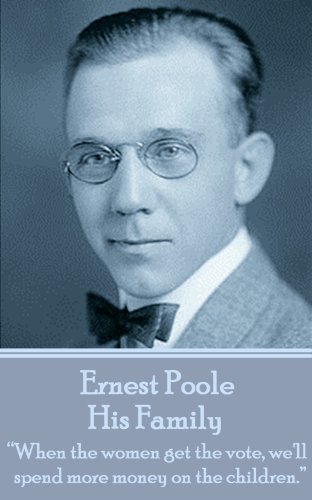 From Goodreads: In this 1918 Pulitzer Prize winning story, widower Roger Gale struggles to deal with the way his children and grandchildren respond to the changing society. His Family is the story of a sixty-year-old New York man who reflects on his life and the lives of his three daughters. The women represent three separate types – one maternal, the second devoted to social movements, and the third living a happy and carefree existence – and the father sees something of himself in each.
From Goodreads: In this 1918 Pulitzer Prize winning story, widower Roger Gale struggles to deal with the way his children and grandchildren respond to the changing society. His Family is the story of a sixty-year-old New York man who reflects on his life and the lives of his three daughters. The women represent three separate types – one maternal, the second devoted to social movements, and the third living a happy and carefree existence – and the father sees something of himself in each.
My take on it: Happy hundredth anniversary to this first Pulitzer award-winning novel! Two recommendations:
1) Give up on judging the 1918 feel of the book. Forget about using the words “stereotyping” and “misogyny” and “sexism” and “racism.” Why? Because this isn’t a 2017 author trying to write a 1917 book. This is a 1917 author writing a 1917 book. So you’re not allowed to pretend you know how Poole should have written it, because you’re not a 1917 author writing a 1917 book, or even a 1917 reader reading a 1917 book.
2) Don’t read the book. LISTEN TO THE FREE LIBRIVOX RECORDING BY JAMES CARSON. Carson isn’t super animated, but I mean- neither is Roger (the book’s main character). Carson’s voice will have you saying “Who is it that he sounds like??” until you figure out that he has a timbre rather like Martin Sheen. Listening to Carson, you’re enveloped in the story because it’s so startlingly as if Roger himself were telling it to you.
Now. The review.
My favorite part of the writing was definitely Poole’s character development. I recently read Grisham’s penultimate offering, The Whistler, and just now I had to think hard about the title because the book was so desperately forgettable, and one of the maddening things was that halfway through Grisham would mention a main character and I still couldn’t remember who the person was. Not in His Family. Almost instantly Poole could drop the name of anyone in Roger’s family and I knew exactly who it was and felt the personality of the person, that’s how good the character development was. I’m not sure when is the last time I read a book that helped me know the characters by name and personality so very, very quickly.
Another feature that stunned me: I often think our world has gone mad, with infighting on every side over issues like women’s rights, immigration, country vs. city, senseless war across the sea, economic changes, poverty and education, motherhood vs. career woman, marriage, children vs. childless “freedom,” etc. This book encouraged me, in a way, that this new age isn’t the end of all things, it’s not the only time we’ve ever struggled with these issues. Truly, I often felt like I was reading a 2017 blog post written in 1917 prose. And the most amazing thing is that it’s a 1917 author doing it. He couldn’t see suffrage 3 years ahead. He couldn’t even see the U.S. entrance into WW1, much less the carnage that would follow in Round 2. (The publication date is 1 month after the U.S. entrance into the war, so his writing must have been finished.)
I’ll be thinking about this book for a long time, especially the perspective on death, how at the end, everyone feels their life isn’t quite finished, and how our influence lives on in those we live behind. The description of Roger’s death at the end was enveloping.
Go. Listen to it now.
Worth Your Time
Hillbilly Elegy, J.D. Vance
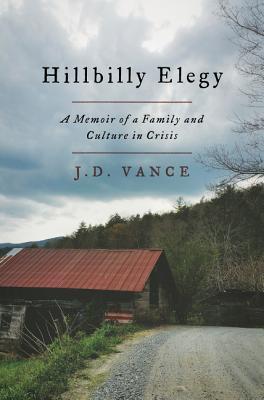 From Goodreads: From a former Marine and Yale Law School Graduate, a poignant account of growing up in a poor Appalachian town, that offers a broader, probing look at the struggles of America’s white working class. Part memoir, part historical and social analysis, J. D. Vance’s Hillbilly Elegy is a fascinating consideration of class, culture, and the American dream.
From Goodreads: From a former Marine and Yale Law School Graduate, a poignant account of growing up in a poor Appalachian town, that offers a broader, probing look at the struggles of America’s white working class. Part memoir, part historical and social analysis, J. D. Vance’s Hillbilly Elegy is a fascinating consideration of class, culture, and the American dream.
My take on it: This book is full of stuff no one is allowed to say except the people who are living it. Society is waiting to crucify anyone who’s willing to say what J.D. says, which is that people need to man up and take personal responsibility and change their lives. That we can change and not whine about being victims of our environment. That answers are gray and people who do bad things also do good things. But you can’t crucify J.D. because he has the right to say it, and he’s said it well. I’ll think of this book every time I wander eastern Kentucky and I’ll be looking for the sets of eyes in the windows.
The Adventures of Nanny Piggins, R. A. Spratt
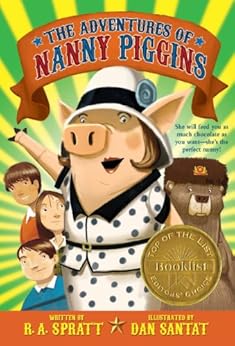 From Goodreads: “Good evening, I am Nanny Piggins,” said Nanny Piggins the pig. When stingy Mr. Green planted a Nanny Wanted sign on his front lawn for his three children, he had no idea his ad would be answered by a pig. Yes, a pig. A fabulously sassy and impeccably dressed pig as a matter of fact! With her insatiable urge to eat chocolate (and feed chocolate to everyone she loves), her high-flying spirit, and her unending sense of fun, Nanny Piggins takes Derrick, Samantha, and Michael on a year of surprises, yummy treats, and adventures they’ll never forget.
From Goodreads: “Good evening, I am Nanny Piggins,” said Nanny Piggins the pig. When stingy Mr. Green planted a Nanny Wanted sign on his front lawn for his three children, he had no idea his ad would be answered by a pig. Yes, a pig. A fabulously sassy and impeccably dressed pig as a matter of fact! With her insatiable urge to eat chocolate (and feed chocolate to everyone she loves), her high-flying spirit, and her unending sense of fun, Nanny Piggins takes Derrick, Samantha, and Michael on a year of surprises, yummy treats, and adventures they’ll never forget.
My take on it: As a family dinner time book, this had us laughing more often than not. I too expected a piggy Poppins but there’s little to endear Sarah Piggins to adults- she’s a deceptive, rebellious, gluttonous, irresponsible influence on her charges, and as long as kids know that, they (and you) will be okay, and perhaps more than a little amused. I want a Boris book.
Along the Infinite Sea, Beatriz Williams
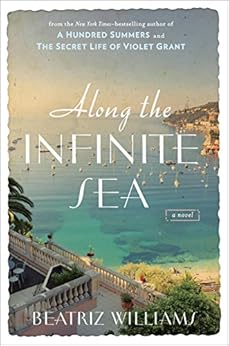 From Goodreads: Each of the three Schuyler sisters has her own world-class problems, but in the autumn of 1966, Pepper Schuyler’s problems are in a class of their own. When Pepper fixes up a beautiful and rare vintage Mercedes and sells it at auction, she thinks she’s finally found a way to take care of herself and the baby she carries, the result of an affair with a married, legendary politician.
From Goodreads: Each of the three Schuyler sisters has her own world-class problems, but in the autumn of 1966, Pepper Schuyler’s problems are in a class of their own. When Pepper fixes up a beautiful and rare vintage Mercedes and sells it at auction, she thinks she’s finally found a way to take care of herself and the baby she carries, the result of an affair with a married, legendary politician.
But the car’s new owner turns out to have secrets of her own, and as the glamorous and mysterious Annabelle Dommerich takes pregnant Pepper under her wing, the startling provenance of this car comes to light: a Nazi husband, a Jewish lover, a flight from Europe, and a love so profound it transcends decades. As the many threads of Annabelle’s life from World War II stretch out to entangle Pepper in 1960s America, and the father of her unborn baby tracks her down to a remote town in coastal Georgia, the two women must come together to face down the shadows of their complicated pasts.
My take on it: It was more risqué than my usual, but not 50 shades by any stretch. Stefan was written an awful lot like a woman, but the rest of the character development and the plot were so well done. I devour World War II stories, and with the across-time aspect of this one, I raced through it. Some favorite quotes:
Stefan:
One can follow the sun, of course, but I have always thought that it is best to know some winter, too, so that the summer, when it arrives, is the more gratefully received.
About pregnancy:
…inconvenient little symptoms that had no obvious link to the biological reality, the peculiar fact that a new and separate human being was growing inside the center of you. You didn’t notice the human being until much later, and you still couldn’t quite picture it in your head, a baby. A real one. A tiny fat red little person.
Von Kleist:
It is the natural duty of the large to protect the small.
Johann:
It is an important business, having a baby. There is a new life to be considered.
About love:
Lady Alice:
Nobody stays in love forever, and then you’re just stuck together out of habit and inertia and bloody sniveling children. If you simply go on having passionate affairs, you never have to give it up. It’s like being in love constantly, for ever and ever, only with different people.
(Until she marries Annabelle’s father. Which is the end of that erroneous perspective.)
Annabelle: “But then they leave you, or they sleep with someone else.”
Lady Alice: “What’s the matter with that? You simply find yourself a new one (philanderer). They’re not rare, I assure you.”
Annabelle: “Because it hurts like the devil.”
Considering safe, faithful Johann, Annabelle:
Imagine that, a lifetime of secure love, a houseful of children and loyalty…. He promised to make my happiness the study of his life.
(I live that, and it’s movie-worthy wonderful.)
A Nazi, about Nazis:
A stooge for these men, these selfish men who will commit any crime to win themselves another gram of power. I have got to do this, I have got to stop them. I have got to do this for my boy.
Dead Wake: The Last Crossing of the Lusitania, Erik Larson
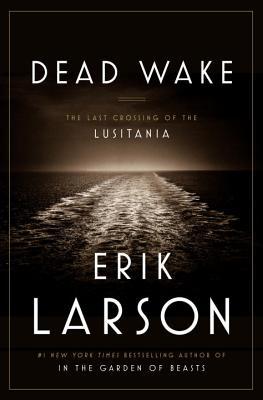 From Goodreads: It is a story that many of us think we know but don’t, and Erik Larson tells it thrillingly, switching between hunter and hunted while painting a larger portrait of America at the height of the Progressive Era. Full of glamour, mystery, and real-life suspense, Dead Wake brings to life a cast of evocative characters, from famed Boston bookseller Charles Lauriat to pioneering female architect Theodate Pope Riddle to President Wilson, a man lost to grief, dreading the widening war but also captivated by the prospect of new love. Gripping and important, Dead Wake captures the sheer drama and emotional power of a disaster that helped place America on the road to war.
From Goodreads: It is a story that many of us think we know but don’t, and Erik Larson tells it thrillingly, switching between hunter and hunted while painting a larger portrait of America at the height of the Progressive Era. Full of glamour, mystery, and real-life suspense, Dead Wake brings to life a cast of evocative characters, from famed Boston bookseller Charles Lauriat to pioneering female architect Theodate Pope Riddle to President Wilson, a man lost to grief, dreading the widening war but also captivated by the prospect of new love. Gripping and important, Dead Wake captures the sheer drama and emotional power of a disaster that helped place America on the road to war.
My take on it: I enjoyed this so much more than In the Garden of Beasts. I felt drawn into the storyline of an event I never knew more about than a few lines in a history book. Well done, Mr. Larson.
The Underground Railroad, Colson Whitehead
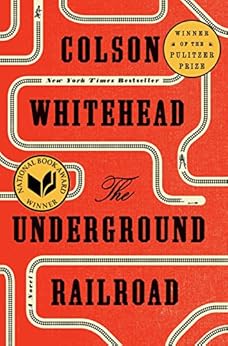 From Goodreads: As Whitehead brilliantly re-creates the unique terrors for black people in the pre-Civil War era, his narrative seamlessly weaves the saga of America from the brutal importation of Africans to the unfulfilled promises of the present day. The Underground Railroad is at once a kinetic adventure tale of one woman’s ferocious will to escape the horrors of bondage and a shattering, powerful meditation on the history we all share.
From Goodreads: As Whitehead brilliantly re-creates the unique terrors for black people in the pre-Civil War era, his narrative seamlessly weaves the saga of America from the brutal importation of Africans to the unfulfilled promises of the present day. The Underground Railroad is at once a kinetic adventure tale of one woman’s ferocious will to escape the horrors of bondage and a shattering, powerful meditation on the history we all share.
My take on it: I came to this book as a Southern white girl. And to justify my 3-star rating, I’m going to go on at some length about being a Southern white girl in 2017.
I’m married to a New Englander and live in the Ohio River Valley now, but I spent the 80’s and 90’s in rural East Central Georgia, in an enormous county with a tiny population, 60% Black, of whom a disproportionate number bore the last name of Jones, and many had never left the county. And speaking of the name Jones, the name also applied to a street and a mansion near the center of town, and the lake outside of town, and a number of other things, and I’m thinking that you can guess why.
I was relatively young when I discovered what the not-South thought about the South. In part I blame it on the reporters who make sure they’re pairing strong accent with low education in those they showcase on the television. In any case, I learned early to fight that accent. That it would brand me as stupid. It wasn’t terribly hard for me- my father from Ohio, my mother mostly from California, and me homeschooled- I could resist the accent. On the rare occasions I’m with friends from back home, it slips back in, but I catch it quick and send it on its way.
I fought the accent, but I proudly offer my origins in a conversation. I love the South. I love that we’re so hospitable that you named hospitality after us. I love that we know that our organic food comes from actual real farms and respect the people who wrest bounty out of the earth. I love that we can spend most of the year outside enjoying the truly fresh air (though we do long for any little flake of snow) (and really, I do not miss that awful humidity).
But I must tell you, we feel the weight of your judgment, real or imagined. Often I think this must be what it’s like to be a modern German, always fighting the stigma of the slavery years. In our minds, aside from the not-South Elites believing we’re unrepentantly ignorant, they think we’d go back to the slavery years in a heartbeat, that we’re still fighting the Civil War in our hearts, that the statues and the flags mean we celebrate the pieces of our history that are rape, torture, oppression, murder.
I can’t tell you how many times in my life I’ve wanted to say “I know. But it wasn’t me.”
But I do remember hints that the Black Africans were the descendants of Ham, and perhaps all the pain they went through stemmed from his Genesis curse, not as a reason to further oppress them, but as a way to find an explanation for what had happened. An explanation outside of us. No- not us. It wasn’t me.
I remember the race riot over the black man who had anemia and died in a hot jail – at least, in my head that’s what it was about. I remember the curfew and the state troopers.
I remember there being black churches and white churches, a black funeral home and a white funeral home, down to divisions in the grocery stores, chicken places, gas stations, that some were patronized mostly by whites, and others were patronized mostly by blacks. And you probably think that’s wrong. And I feel like I’m supposed to think that’s wrong. And it felt completely normal. It felt like everyone liked it that way. No one made the rules. We just all followed them anyway. But now I ask myself, do I think that because I’m white?
I know it happened in Georgia. I know I’m from Georgia. That was history, and it wasn’t me.
And now to the book.
Although other reviews will point out to you that this book was fiction, and not historical fiction, when you open it and read the Library of Congress classification, that’s what it says. Historical fiction. It’s not. I want to say, “But Colson, the history is horrible enough. Why didn’t you leave the fiction to the characters? Why so much fiction in the surroundings, too?” Someone even remarked in a review that he must have done a ton of research. I beg to differ. Even for an educated mind – not any of those Georgia-accented people, mind you – it’s tough to tease the history out here. As another reviewer said, we’re confronted with “fake” history we suspect could not be true, and we’re annoyed we have to go elsewhere to verify that we were right.
Everyone will know there wasn’t a real railroad under the ground. It’s preposterously imagined.
But will you know that Georgia wasn’t a dark place so evil that no one would ever believe the underground railroad reached into its darkness?
Will you know that South Carolina never pretended to institute a “negro betterment” program in order to perform medical experiments and purify and limit the African races?
Will you know that North Carolina didn’t outlaw the Negro races and then ferret them and their protectors out and string them up in a weekly festival before using their corpses to decorate the road into every town?
And after all that treatise, I’ll echo what others also said about the characters: perhaps making it a first-person narrative from Cora’s view would have made us care more. If you’re going to paint it something it wasn’t, even as horrible as it was, at least make us care about the humans involved.
Hunger of Memory: The Education of Richard Rodriguez
 From Goodreads: Here is the poignant journey of a minority student who pays the cost of his social assimilation and academic success with a painful alienation–from his past, his parents, his culture–and so describes the high price of making it in middle-class America.
From Goodreads: Here is the poignant journey of a minority student who pays the cost of his social assimilation and academic success with a painful alienation–from his past, his parents, his culture–and so describes the high price of making it in middle-class America.
My take on it: This was a quick and fairly easy read. Rodriguez offers a brief series of well-written, deeply thoughtful essays on his family, their language and religion and traditions, and how his education and assimilation into the educated U.S. society separated him from all of those and labeled him. I thought it was well-written, and it made me think hard about things I thought I knew about when I had no real insight on them. I’d actually written an essay against bilingual education in high school, and then thought more about it thanks to my aunt being a bilingual ed teacher in Arizona and to the arguments from Stephen Krashen. Richard tries to be a strong voice of experience on my early side, against bilingual education. Regardless of where I end up on the issue, I’m glad to have Richard’s personal insight.
Camino Island, John Grisham
 From Goodreads: A gang of thieves stage a daring heist from a secure vault deep below Princeton University’s Firestone Library. Their loot is priceless, but Princeton has insured it for twenty-five million dollars.
From Goodreads: A gang of thieves stage a daring heist from a secure vault deep below Princeton University’s Firestone Library. Their loot is priceless, but Princeton has insured it for twenty-five million dollars.
Bruce Cable owns a popular bookstore in the sleepy resort town of Santa Rosa on Camino Island in Florida. He makes his real money, though, as a prominent dealer in rare books. Very few people know that he occasionally dabbles in the black market of stolen books and manuscripts.
Mercer Mann is a young novelist with a severe case of writer’s block who has recently been laid off from her teaching position. She is approached by an elegant, mysterious woman working for an even more mysterious company. A generous offer of money convinces Mercer to go undercover and infiltrate Bruce Cable’s circle of literary friends, ideally getting close enough to him to learn his secrets.
But eventually Mercer learns far too much, and there’s trouble in paradise as only John Grisham can deliver it.
My take on it: The reason I gave this 4 stars on Goodreads instead of 3 is probably that I came to it just off of The Whistler, the absolute worst excuse for a Grisham novel yet. Mercer is underdeveloped and doesn’t stir anything in you, but Grisham had me rooting for the good guys and the bad in this one, and that’s a fun conflict. And I knew who the characters were through the story, a vast improvement over Whistler.
The Kept Woman, Karin Slaughter
 From Goodreads: With the discovery of a murder at an abandoned construction site, Will Trent of the Georgia Bureau of Investigation is brought in on a case that becomes much more dangerous when the dead man is identified as an ex-cop.
From Goodreads: With the discovery of a murder at an abandoned construction site, Will Trent of the Georgia Bureau of Investigation is brought in on a case that becomes much more dangerous when the dead man is identified as an ex-cop.
Studying the body, Sara Linton—the GBI’s newest medical examiner and Will’s lover—realizes that the extensive blood loss didn’t belong to the corpse. Sure enough, bloody footprints leading away from the scene indicate there is another victim—a woman—who has vanished . . . and who will die soon if she isn’t found.
Will is already compromised, because the site belongs to the city’s most popular citizen: a wealthy, powerful, and politically connected athlete protected by the world’s most expensive lawyers—a man who’s already gotten away with rape, despite Will’s exhaustive efforts to put him away.
But the worst is yet to come.
My take on it: My first Slaughter book: the profanity and careless, commitment-free relationships were distracting and not my style. That said, the plot was highly interesting with characters so well developed that every time she mentioned someone I thought “Oh yes, I know who that is.” Only the green assistant ME, a forgettable side character, was oddly developed.
Behind Closed Doors, B.A. Paris
 From Goodreads: Everyone knows a couple like Jack and Grace: he has looks and wealth, she has charm and elegance. You’d like to get to know Grace better. But it’s difficult, because you realize Jack and Grace are never apart. Some might call this true love.
From Goodreads: Everyone knows a couple like Jack and Grace: he has looks and wealth, she has charm and elegance. You’d like to get to know Grace better. But it’s difficult, because you realize Jack and Grace are never apart. Some might call this true love.
Picture this: a dinner party at their perfect home, the conversation and wine flowing. They appear to be in their element while entertaining. And Grace’s friends are eager to reciprocate with lunch the following week. Grace wants to go, but knows she never will. Her friends call—so why doesn’t Grace ever answer the phone? And how can she cook such elaborate meals but remain so slim?
And why are there bars on one of the bedroom windows?
The perfect marriage? Or the perfect lie?
My take on it: As far as capturing you and holding attention, five stars. I started and finished it in 24 hours in a season where I was hard pressed to find time to read a few pages. I found the time for this one (but didn’t get a lot of sleep!). But as the novel wore on I felt the writing got sloppy, like she was in a hurry to meet a deadline and was churning out canned, stilted phrases. Also, in spite of what the epilogue interviewer says, the characters are not that believable. I don’t know a couple like Jack and Grace. And I don’t know anyone else who does. [SPOILER] He’s after the sister and not the wife, because he can smell fear? He wants her as a wife “in name only”? I don’t think so.
Meh
The Guilty, David Baldacci
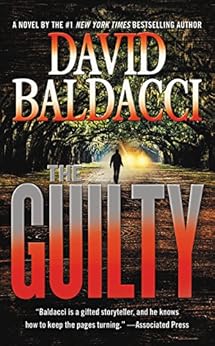 From Goodreads: Will Robie escaped his small Gulf Coast hometown of Cantrell, Mississippi, after high school, severing all personal ties, and never looked back. Not once. Not until the unimaginable occurs. His father, Dan Robie, has been arrested and charged with murder.
From Goodreads: Will Robie escaped his small Gulf Coast hometown of Cantrell, Mississippi, after high school, severing all personal ties, and never looked back. Not once. Not until the unimaginable occurs. His father, Dan Robie, has been arrested and charged with murder.
My take on it: Typical David Baldacci- fantastically impossible superheroes in a plot so convoluted there are two or three extra plots you’re not sure have much more purpose than to take up space (the preacher’s daughters, the sick football friend, the casino people), but in true Baldacci form, he pulls you in and keeps you there to the end.
The Whistler, John Grisham
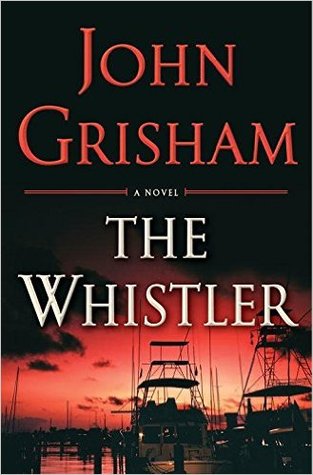 From Goodreads: We expect our judges to be honest and wise. Their integrity and impartiality are the bedrock of the entire judicial system. We trust them to ensure fair trials, to protect the rights of all litigants, to punish those who do wrong, and to oversee the orderly and efficient flow of justice. But what happens when a judge bends the law or takes a bribe? It’s rare, but it happens.
From Goodreads: We expect our judges to be honest and wise. Their integrity and impartiality are the bedrock of the entire judicial system. We trust them to ensure fair trials, to protect the rights of all litigants, to punish those who do wrong, and to oversee the orderly and efficient flow of justice. But what happens when a judge bends the law or takes a bribe? It’s rare, but it happens.
My take on it: As late as halfway through the book, I was incredulous that Grisham could have written it. He mentioned characters – I mean main characters and I didn’t know who they were. Why couldn’t I care about the characters? Why couldn’t I even remember them? Where was the heinous injustice of the crime? And then, it got… okay. Almost Grisham.
Lies Women Believe, Nancy Leigh Demoss
 From Goodreads: In best selling Lies Women Believe, Nancy exposes those areas of deception most commonly believed by Christian women—lies about God, sin, priorities, marriage and family, emotions, and more. She then sheds light on how we can be delivered from bondage and set free to walk in God’s grace, forgiveness, and abundant life.
From Goodreads: In best selling Lies Women Believe, Nancy exposes those areas of deception most commonly believed by Christian women—lies about God, sin, priorities, marriage and family, emotions, and more. She then sheds light on how we can be delivered from bondage and set free to walk in God’s grace, forgiveness, and abundant life.
My take on it: If you’re on the far conservative, Bible-respecting side of evangelical Christianity, you’ll find this book excellent. Demoss takes so many of the lies we really do believe and helps us really fight them with the truth of the Word of God.
If you’re not sold on some of the hardest, more “radical” teachings of the Bible, specifically regarding the special gifts and God’s best plan for women, you’ll want to burn this book. Call it your independent spirit, call it your family’s financial situation that sends you and your children separate ways out of the house each day, you’ll want to find every reason you can to say “No, Nancy, surely that can’t be what God actually meant. You’ve got it wrong.”
I know, because I had to figure out those reactions in my own heart.
But if you have a discerning heart, a spirit that can take a hard look at why you think one thing and Demoss thinks another, and then come out somewhere in between or one side or another, and know why you’ve done that, and then keep reading, you’ll get the most out of this book. More than you would if you swallowed every word hook, line, and sinker. More than you would if you threw it at the wall as a bunch of antiquated, oppressive patriarchal propaganda.
So why 3 stars?
First, because of the writing of Eve’s diary. Demoss isn’t a fiction writer. The introductory sections written as if they were from Eve’s diary are hard to stomach and harder to believe. And there wasn’t a point in including them. I dislike reading what people think Bible characters would have said.
Second, because of the same issue I had with a counselor I met with not long ago: yes, I believe the Bible. Yes, I believe it’s true at all times and in all situations and contains insight on all the answers to life’s hard questions. But it makes it exponentially more helpful to me when the insight is being communicated by someone who’s been there. Someone who’s been married more than a few years. Someone who isn’t horrified at your confession of crazy thoughts about your kids because she remembers having those thoughts and how she fought them. Demoss can’t talk from the voice of experience about the issues that have been the hardest for me, and that’s the story behind my 3 stars.
Happy new year, everyone. What amazing books did you read this year? What’s on your reading list for 2018?
2 Comments
Comments are closed.




[…] author of a recent Pulitzer novel, The Brief and Wondrous Life of Oscar Wao, on my radar because reading all the Pulitzers is on my bucket […]
[…] and had 7 children, homeschooled them, served in church – in short, her book is what I hoped Nancy Leigh Demoss’s book would be. Demoss writes “The Bible has all the answers” – which is very true […]